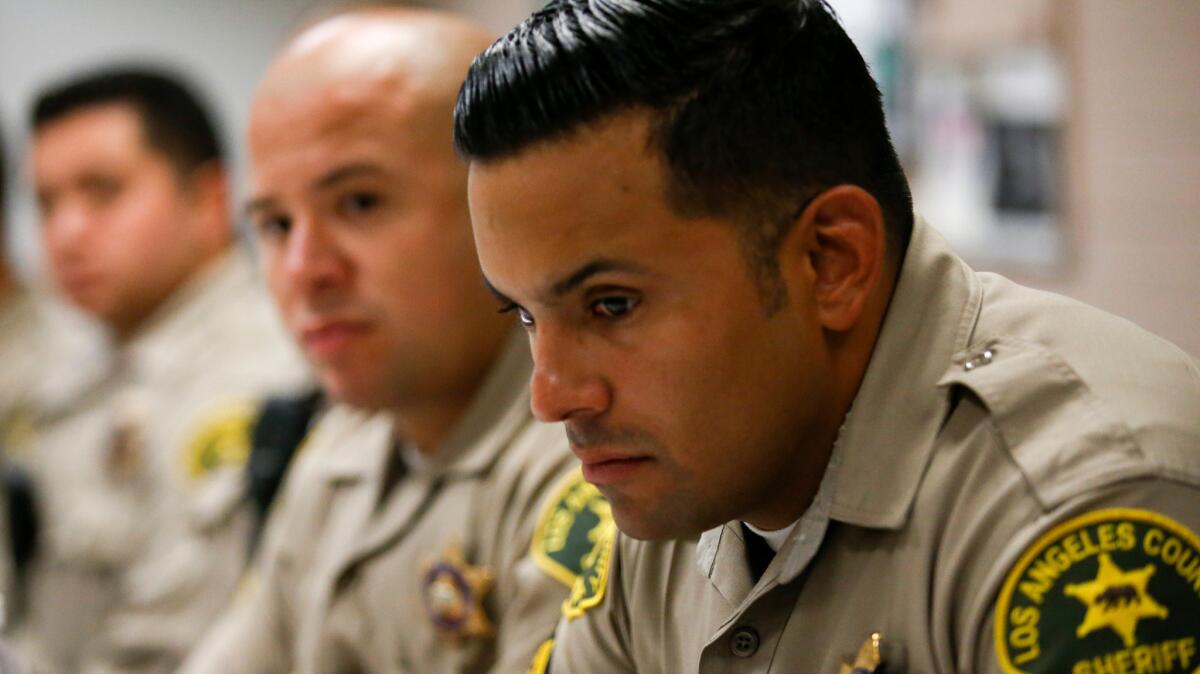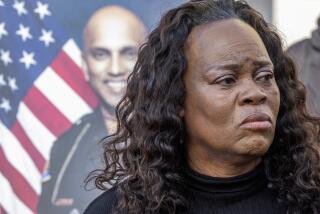For many cops in L.A., the Dallas sniper attack was ‘worst nightmare’

- Share via
The first call of the night: a fight at a Compton apartment complex with a machete, maybe a handgun.
Los Angeles County Sheriff’s Deputy Ryan Kearns, 36, knew these apartments. Deputies had previously gone there several times looking for a man with a rifle, he said.
Kearns had just learned of the police officers fatally shot by a sniper in Dallas a couple hours before. The news at that point said four had died, more were in critical condition.
His wife told him to text him every two hours, even though he was working an overnight shift. He worried about how his 15-year-old son would react to the news in Texas, what questions he might ask.
As he and his trainee pulled up to the scene, Kearns could feel his heart pounding.
More deputies showed up, more than normal, he thought.
“With Texas and the history of calls there, at this point, my worst nightmares were going through my head,” he recalled Friday.
Fortunately, the fight was over. No arrests made. No weapons found.
But the shooting in Dallas on Thursday night – which ultimately left five cops dead and seven wounded – will haunt officers for weeks and months to come, law enforcement officials said Friday.
“It makes me sad,” said Ed Medrano, Gardena’s police chief. “This tragedy makes police officers more apprehensive than ever at a time when we are encouraging more engagement with the community.”
Medrano, speaking before the beginning of a state hearing in downtown L.A. on racial profiling, said the last few years have been tough for officers and Thursday’s loss of life reinforced the feeling many have that they are under siege.
Vocal hostility toward the police has been mounting with every new video of cops shooting unarmed black men, including two this week in Louisiana and Minnesota. Some blame the Black Lives Matter movement for fanning hatred against officers that has led to deadly ambushes.
In December 2014, two officers in Brooklyn were shot to death as they sat in their patrol car. Last May, two officers were gunned down in Mississippi during a routine traffic stop. In August, a sheriff’s deputy outside of Houston was shot to death as he put gas in his patrol car, and two Louisiana officers were killed in separate incidents.
“Officers get resentful. They get afraid. They will do their jobs and get out in the community, but they will be less motivated,” Medrano said.
He said the images from Dallas “showed the same officers the crowd was protesting protecting them when shots were fired. They ran toward the gunfire,” Medrano said. “They were there to protect and police the crowd and they did that, and for that officers are proud.”
Before the Dallas shooting, 21 officers were killed by gunfire and eight by vehicle assault this year, according to the nonprofit Officer Down Memorial Page, an organization that tracks law enforcement killed in the line of duty.
But despite the recent attacks, the numbers of officers dying on the job has dropped markedly since the 1970s.
In 2012, before the Black Lives Matter movement, 48 officers were shot to death, five were stabbed to death and 11 were killed by vehicular assault. Last year, 39 fell to gunfire, and 11 died during other types of assaults.
Still, the targeted killing of officers during routine duties – sitting in a squad car, buying gas, keeping a demonstration under control – has shaken many officers’ core sense of safety.
In Compton, Glendale and other areas, patrol officers rode two to a car on Friday instead of solo as usual. Sheriff’s Capt. Michael Thatcher said his deputies in Compton were doing so not only for safety reasons but so they could talk to each other about what happened.
Thatcher and other supervisors urged the deputies to act professionally because some people might want to test them after what happened in Dallas.
“You may have your emotions about this, but conduct your business in a professional way,” Thatcher said at a staff briefing. “This is a time where we’re put to the test, and the community looks at us to see how we react.”
One of the slain Dallas officers, Lorne Ahrens, had previously worked as a civilian for the Los Angeles County Sheriff’s Department for 11 years before transferring to Texas in 2002.
Less than 12 hours after the killings, three dozen recruits sat in the plaza of the LAPD’s downtown headquarters for graduation, staring solemnly ahead as Mayor Eric Garcetti spoke.
Full coverage: Dallas police shootings >>
“Today was supposed to be a happy day,” the mayor said. “But we come here today with tears in our eyes, with hearts that are broken.”
Fear and anger curdled the usual celebratory mood of the ceremony. One veteran officer’s eyes welled with tears as he talked about the attack.
“Do not take this as an opportunity to retreat,” Chief Charlie Beck told his officers. “America needs to have a dialogue, and that dialogue cannot break down.”
He turned to the families of the LAPD’s newest officers, acknowledging the fear and worry they carried and making a promise: As long as the officers protect and serve the city, he will protect and serve them.
“Don’t be afraid,” he told their families. “Be proud.”
As the graduation commenced, a group of people, many from South Los Angeles, led by rappers Snoop Dogg and The Game, marched up to the metal barricades that blocked off the plaza.
They were there, one man said, not to protest the police, but to try to “make things better.”
“There’s definitely a great divide between the police and the people,” said Jeret Griffin-Black, a 36-year-old vocalist from South L.A. “We’re trying to remove that fear.”
When the ceremony ended, as the LAPD’s newest officers threw their hats in the air and hugged, police led a handful of the marchers into the department’s glass headquarters. Snoop Dogg and The Game had a private meeting with Garcetti, Beck and other top police officials.
The group emerged 45 minutes later, after what Garcetti described as an “extraordinarily powerful meeting.”
They spoke of the rage they felt this week, seeing videos of police shootings in Baton Rouge and Minnesota, learning that police officers had been killed by a sniper in Dallas. They found common ground in that anger, said Beck, whose eyes filled with tears as he spoke.
“This cannot continue,” Beck said. “We cannot continue to break into camps. We cannot continue to go to our corners and come out fighting.”
The Game, whose name is Jayceon Terrell Taylor, said he felt restless after the shootings in Minnesota and Louisiana. He struggled with how to answer his son’s questions about the police. He couldn’t sleep. He was sad, he said, and angry.
When news of the shooting in Dallas broke, the rapper said, he thought of the families of the officers who were killed.
“I took those police uniforms off of those police officers that met an untimely demise last night and I turned them into what they really are before they put them on,” he said. “And those are human beings, like me and everyone standing here.”
Times staff writer Richard Winton and Alene Tchekmedyian contributed to this report.
For more news, follow us on Twitter: @cindychangLA, @katemather and @joemozingo.
ALSO
‘Loner’ Dallas gunman had bomb materials, kept journal of combat tactics
What we know about the Dallas gunman: Army veteran reportedly said he ‘wanted to kill white people’
‘Why are people mad at each other?’ Explaining another shocking week of violence to your kids
UPDATES:
4:31 p.m.: This article was updated to include that one of the slain officers previously worked for the Los Angeles County Sheriff’s Department.
This article was originally published at 3:35 p.m.
More to Read
Sign up for Essential California
The most important California stories and recommendations in your inbox every morning.
You may occasionally receive promotional content from the Los Angeles Times.













